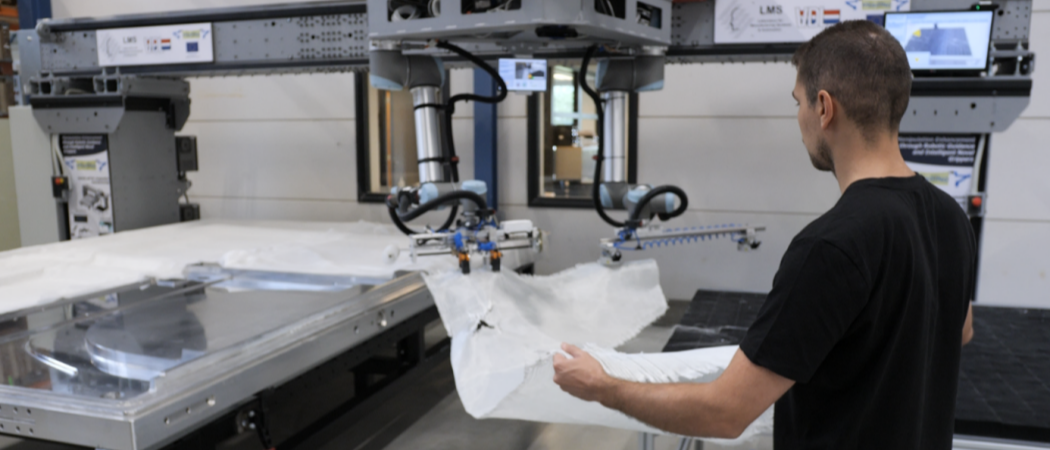Robotics begin to handle flexible materials opening up opportunities for European factories

21.12.2023
News
(Originally on ScienceBusiness)
Robots are using technologies developed by the H2020 MERGING project to automate manufacturing processes involving non-rigid materials. Funded by the ‘Factories of the Future’ partnership, the project is aligned with the research and innovation priority roadmap developed by the European Factories of the Future Research Association (EFFRA).
Robots struggle to handle flexible materials. The lack of rigidity introduces handling uncertainties that mean conventional automation systems are unable to control deformation within the required accuracy and repeatability standards. As a result, key industrial sectors, such as garment manufacturing and the production of high-value composites in the transport sector, rely entirely on human labour.
Unable to automate these operations, European production firms face rising employment costs and the outsourcing of manufacturing lines to low-cost labour countries. A prime example is the European textile and clothing industry, where according to EURATEX, in 2021, imports surpassed exports by €48 billion; with China being a leading supplier, followed by Turkey. MERGING, a four-year project, coordinated by CEA-LIST, demonstrates the potential of bringing production back to Europe, in accordance with the objectives of its funding programme.
Robot manipulation enhancement in autonomous and collaborative industrial cases
Technology developed by MERGING has been successfully deployed in three key industrial sectors. In the food packaging sector, MERGING has automated the repetitive tending of flexible pouches into food packing machines for Thimonnier. Two robot arms, supported by machine vision, perceive the positions of the pouches prior to delicate handling using electro-adhesive grippers.
In the textiles sector, a collaborative cell was commissioned for Selmark. Two robot arms jointly de-stack, transfer and inspect lingerie fabrics using electro-adhesive grasping. Finally, for the automotive sector, a hybrid cell for composites layup was installed at VDL Fibertech. Engineered by LMS, a novel dual-arm robotic system assists operators by autonomous or collaborative transferring and laying-up composite materials. Multi-modal perception, mixed reality interfaces and motion planning using artificial intelligence contribute to a human-centric solution that preserves quality and efficiency.
“Robots are now capable of proficiently and repeatedly handling deformable objects autonomously or in collaboration with operators,” says Dionisis Andronas from the Laboratory for Manufacturing Systems and Automation (LMS), and technical manager of the MERGING project. “This reveals new opportunities for European industries that can revolutionise the economic landscape”. Christine Rotinat from the French Alternative Energies and Atomic Energy Commission (CEA), coordinator of the MERGING project, stresses that “some of these technologies can be rapidly applied to industrial applications, and at a relatively low cost. This opens access also for SMEs to innovative robot programming or electro-adhesion-based gripping solutions.”
The next step for non-rigid product manufacturing
The project’s technological milestones have uncovered new challenges. “As the research outcomes redefine the baseline, factors such as technology acceptance, cost-effectiveness, and compliance with legislation emerge as critical discussion points and objectives for the future,” says Dr. Sotiris Makris leader of the Robotics, Automation and VR in Manufacturing group of LMS. As solutions increasingly rely on data, there is a growing need to up-skill operators and address cybersecurity and ethical concerns within updated legislative frameworks.
MERGING participates in the Hybrid Production Systems cluster that, among others, fosters knowledge sharing among projects focusing on the maturation of robotic flexible material handling. EFFRA shares this vision and through its partnership with the European Commission; under Made in Europe and the preceding Factories of the Future programmes, steers European Manufacturing towards a more competitive and sustainable future. Together, innovation communities, particularly EIT Manufacturing, play a crucial role in accelerating the commercialisation of the innovative outcomes.








